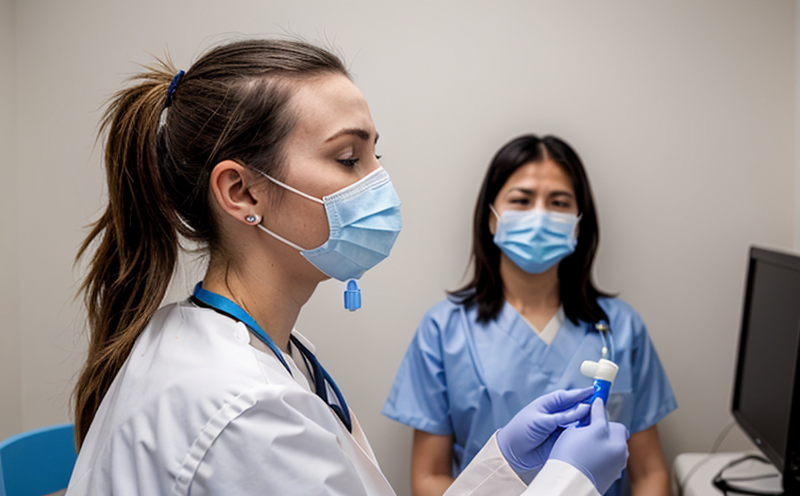Respiratory Pathogen Testing in Companion Animal Clinics
The respiratory system plays a crucial role in the overall health and well-being of companion animals. Respiratory diseases can range from mild to severe, affecting various organs such as the lungs, trachea, and bronchi. Accurate diagnosis is essential for effective treatment and management of these conditions. In recent years, advancements in diagnostic technology have made it possible to identify specific pathogens causing respiratory infections in pets more quickly and accurately.
Respiratory pathogen testing involves identifying infectious agents responsible for respiratory diseases through various methods including polymerase chain reaction (PCR), culture, serology, and antigen detection tests. These tests are particularly useful when dealing with viral, bacterial, fungal, or parasitic pathogens that can cause symptoms like coughing, nasal discharge, sneezing, fever, difficulty breathing, lethargy, and loss of appetite.
Companion animal clinics face unique challenges in diagnosing respiratory diseases due to the diverse range of potential causes. Understanding the specific pathogen responsible for an infection allows veterinarians to tailor treatments more effectively, reducing unnecessary use of antibiotics or other medications that may not be appropriate for viral infections. Early detection also helps prevent the spread of infectious agents within the clinic environment and among pets in multi-pet households.
Standard operating procedures (SOPs) play a vital role in ensuring consistent quality control during respiratory pathogen testing. These include proper specimen collection, transport conditions, sample processing times, and interpretation of results based on established reference ranges. Proper training for staff involved in specimen handling, laboratory technicians performing tests, and clinicians interpreting the findings ensures accurate diagnoses.
Companion animals often exhibit subtle signs of illness which can be mistaken for other conditions if not properly diagnosed. Efficient respiratory pathogen testing supports early intervention strategies aimed at preventing complications such as pneumonia or chronic bronchitis. By detecting pathogens promptly, veterinarians can implement targeted therapies that address the root cause rather than treating symptoms alone.
Respiratory pathogen testing services provided by accredited laboratories are designed to meet stringent regulatory requirements set forth by organizations like the American Animal Hospital Association (AAHA), The Association for Assessment and Accreditation of Laboratory Animal Medicine (AAALAC), and International Organization for Standardization (ISO). These standards ensure reliability, accuracy, reproducibility, and traceability across different testing platforms.
Accredited laboratories specializing in respiratory pathogen testing employ highly trained professionals equipped with state-of-the-art equipment capable of detecting even the most elusive pathogens. This expertise translates into faster turnaround times for test results, enabling quicker decisions regarding patient care plans without compromising on accuracy or precision.
Applied Standards
| AWS 58 | Title | Description |
|---|---|---|
| AWS 58:2019 | Respiratory Pathogen Testing in Companion Animal Clinics | This standard establishes best practices for the collection, transport, and analysis of specimens from companion animals exhibiting signs of respiratory disease. It covers requirements related to personnel qualifications, facility design, equipment calibration, reagent stability, quality assurance measures, data management systems, and reporting formats. |
| AWS 58:2019 | Respiratory Pathogen Testing in Companion Animal Clinics | This standard provides guidelines for selecting appropriate testing methods based on the suspected pathogen(s) involved. It includes criteria for determining when to use PCR versus culture techniques, as well as considerations for rapid antigen detection tests. |
| AWS 58:2019 | Respiratory Pathogen Testing in Companion Animal Clinics | This standard specifies acceptance criteria for both qualitative and quantitative testing results. These thresholds help ensure that any detected pathogens are reliably identified even at low concentrations. |
Scope and Methodology
The scope of respiratory pathogen testing encompasses all aspects involved in diagnosing infectious agents responsible for respiratory diseases in companion animals. This includes specimen collection from various anatomical sites such as nasal passages, trachea, bronchi, or lung tissue samples obtained via endoscopy or surgery.
Once collected, specimens must be transported under optimal conditions to minimize degradation of fragile pathogens. Depending on the suspected pathogen and test method chosen, different sample types may require specialized preservation solutions. For example, viral RNA can degrade rapidly outside the host organism; thus, immediate processing or refrigeration is necessary until testing begins.
There are several methodologies available for respiratory pathogen testing:
- PCR: This molecular biology technique amplifies specific regions of DNA from the pathogen present in the specimen. It allows detection of even minute quantities of genetic material.
- Culture: Isolation and growth of viable pathogens on appropriate media allow identification through microscopic examination or biochemical reactions.
- Serology: Measurement of antibodies produced by the animal’s immune system against a particular pathogen provides evidence of past exposure but does not differentiate between active infections and previous encounters.
- Antigen detection tests: These assays target proteins unique to certain pathogens, offering rapid results suitable for point-of-care testing in clinical settings.
The choice of methodology depends on factors such as the suspected pathogen, resources available at the clinic, turnaround time requirements, and cost considerations. Each approach has its strengths and limitations which should be carefully considered when selecting the most appropriate diagnostic tool for a given case.
Benefits
- Prompt identification of respiratory pathogens enables timely initiation of targeted treatments, improving patient outcomes.
- Avoidance of unnecessary antibiotic usage reduces potential side effects and promotes responsible use of antimicrobial agents.
- Early detection minimizes the risk of transmitting infections between animals within the clinic or household environment.
- Accurate diagnosis supports evidence-based decision-making by veterinarians, enhancing overall care quality.
- Standardized procedures ensure consistent results across different laboratories and testing platforms, promoting interlaboratory comparison when necessary.
- Rapid turnaround times allow for quicker patient discharge from the clinic while ensuring appropriate follow-up visits are scheduled if further monitoring is needed.





